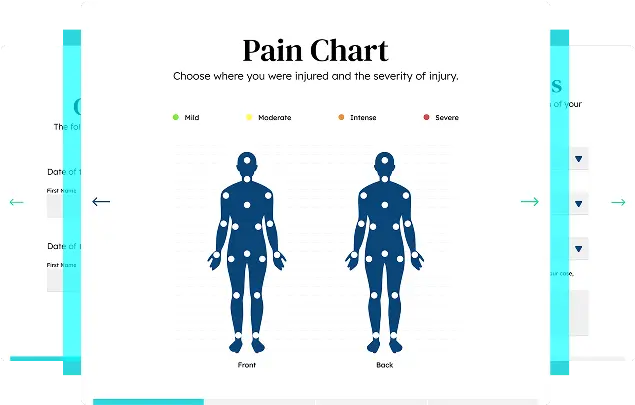Boston Personal Injury Lawyer
If you’ve been injured by someone else’s negligence, you need an attorney who understands what you’re going through. At DiBella Law Injury and Accident Lawyers, we pride ourselves on providing compassionate and skilled legal representation to make the toughest time in your life easier. Contact us online or call (617) 870-0907 today for a free case review.
Get Free Advice About The Compensation You Deserve
Home » Boston Personal Injury Lawyer
Reviewed by: Christopher DiBella
April 18, 2025
On This Page
- Why Work with the Boston Personal Injury Attorneys at DiBella Law?
- Common Types of Personal Injury Claims in Boston
- How a Personal Injury Lawyer Helps Victims of Negligence
- What Compensation is Available in a Boston Personal Injury Lawsuit?
- Serving Boston, MA, and Surrounding Areas
- Massachusetts’ Statute of Limitations for Personal Injury Lawsuits
- What to Do After an Injury
- Contact Our Personal Injury Lawyers for a Free Case Review
- DiBella Law has over 20 years of experience fighting and winning for personal injury victims in Boston and throughout Massachusetts.
- We can handle every step of the claims process for you, from a free consultation to gathering evidence and negotiating with insurance companies.
- Every case is personal for us because we treat our clients like family. We’ve recovered millions of dollars in settlements and verdicts for injury victims like you.
- Our Boston personal injury lawyers will provide a free case review and won’t charge you anything unless we win your case.
Why Work with the Boston Personal Injury Attorneys at DiBella Law?
For us, Every Case Is Personal. Injury victims in Boston and throughout Massachusetts trust our team for our more than 20 years of experience, personal service, and results-driven approach. Our attorneys are all local to the area and deeply familiar with the complexities of Bay State law. We offer services in English and Spanish to serve all members of our community.
Founding partner Christopher DiBella treats his clients like family because he’s been in their shoes. During his youth, DiBella’s brother was injured in a car accident—an experience that has enabled him to empathize with injury victims.
“Having experienced firsthand the traumatic experience of having my brother injured in a terrible car accident has given me a better understanding of the real impact accidents have on victims and their families.” – Chris DiBella
DiBella has been recognized for his compassionate and skilled representation by Super Lawyers from 2020 through 2024 and was named among that organization’s “Rising Stars” from 2011 through 2017.
We’ve recovered millions of dollars in settlements and verdicts for our clients. Our notable Boston personal injury case results include a $2.1 million settlement for a pedestrian seriously injured in a hit-and-run accident and a $625,000 award for an elderly client who fell and suffered a traumatic brain injury due to a transportation company’s negligence.

“Attorney DiBella and his staff were very professional and made me feel as if I was truly important to them, just not another case. My case was a complicated one due to the fact that I live in another state, but they were able to work with me and get things done. Thank you, Attorney DiBella and staff, for all that you did for me and my family.” – Harry
Common Types of Personal Injury Claims in Boston
Our nationally recognized team is well-versed in a wide variety of personal injury cases. Our familiarity with local laws and how they interact with each type of claim helps us maximize your compensation. Examples of common Boston personal injury lawsuits include:
- Auto accidents: Car, truck, bus, and motorcycle crashes are relatively common but can cause life-changing or even fatal injuries. Our attorneys can help you hold reckless and negligent drivers accountable.
- Slip and fall accidents: Property owners are responsible for keeping their properties safe. If you were hurt by an unaddressed safety hazard, we can help you hold the property’s owner accountable through a premises liability claim.
- Wrongful death: Unfortunately, personal injury accidents can become fatal. If your loved one has died from an accident, our compassionate attorneys can help you file a wrongful death claim and get the justice you and your family deserve.
- Workplace injuries: While workers’ compensation covers most workplace accidents, some can result from negligence by parties other than your employer. If a contractor, property owner, or other third party contributed to an on-the-job injury, you can pursue claims against them to supplement your workers’ compensation benefits.
Boating and recreational accidents: Like any other vehicle, boats require patience and caution to operate responsibly. Negligent boaters can cause drownings, collisions, or carbon-monoxide poisoning for themselves, passengers, or those around them. Our Boston personal injury lawyers know how to hold reckless boaters accountable.
Other claims we handle include dog bites, medical malpractice, product liability, nursing home abuse, and more. If you’re uncertain whether your case fits into one of these categories, call us today at (617) 870-0907 for a free evaluation.
How a Personal Injury Lawyer Helps Victims of Negligence
Our Boston personal injury lawyers can handle every aspect of your claim for you, keeping you stress-free as you heal and move forward. Throughout the process, the DiBella Law team will keep you in the loop through open communication and professional guidance.
Free Consultation & Case Evaluation
Our work begins with your free consultation and case evaluation. Once you call and schedule your meeting, our skilled team will review the circumstances of your case, discuss the potential strength, value, and timeline of your claims, and help you understand your legal options.
Thorough Investigation and Evidence Gathering
Your lawyer will collect all available evidence to help paint a clearer picture of the accident and who was responsible, including police reports, video surveillance, and witness testimonies. Then, they will get to work building you the strongest possible case.
Handling All Communication & Negotiation with Insurance
You won’t need to suffer through any discussions with insurance companies. Your attorney can take care of any necessary communications and handle all settlement negotiations, ensuring you receive a fair deal.
Litigation & Going to Trial
Sometimes, insurance companies or liable parties refuse to offer a settlement that fully and fairly compensates for your damages. If that happens, we won’t back down and take a lowball offer that doesn’t properly compensate you for your injuries. Our Boston personal injury lawyers are not afraid to battle in court to secure you the compensation you deserve.
“DiBella Law is outstanding! During an urgent time of need, Chris DiBella and his legal team were exceptionally responsive and promptly provided me with expert legal counsel and guidance. Not only did they handle everything with ease, but they listen and communicate with you throughout the process, providing you with the best legal knowledge to empower your decisions, all while working hard to optimize your outcome.” – Christine
We’ve offered crucial support and guidance to individuals who have suffered injuries, ensuring their financial and emotional well-being.
What Compensation is Available in a Boston Personal Injury Lawsuit?
Personal injury victims in Boston may be entitled to various damages for their losses. These include economic damages, which cover financial losses, and non-economic damages, which compensate for impacts on your quality of life.
Common types of compensation recoverable in personal injury claims include the following:
- Medical expenses
- Lost wages and future earnings
- Pain and suffering
- Property damage
- Disfigurement
- Loss of enjoyment
- Loss of companionship
- Emotional distress
If the liable party acted intentionally or with extreme negligence, you may also be entitled to punitive damages. Our attorneys will pursue full and fair compensation on your behalf, seeking all damages you are entitled to for your injuries.
Serving Boston, MA, and Surrounding Areas
Our team is based in Boston, with our main office located at 659 Massachusetts Ave. However, we have the technology, tools, and resources to travel to clients or visit remotely if necessary.
Additional Boston-area locations we serve include:
- Cambridge
- Somerville
- Brookline
- Newton
- Medford
- Quincy
Get immediate case evaluation with no cost or obligation to you in less than 5 minutes.

Massachusetts’ Statute of Limitations for Personal Injury Lawsuits
If someone’s negligent, careless, or reckless action has injured you, you have a limited time to take legal action. Generally, the statute of limitations for personal injury cases in Massachusetts is three years from the accident date.
It’s essential to adhere to this deadline, as failing to file within the specified time frame can result in the court dismissing your case, barring you from pursuing any compensation.
However, some exceptions occasionally apply, so consult an experienced personal injury attorney to understand what time limit applies to your particular situation.
What to Do After an Injury
The immediate aftermath of an accident can be very confusing and frightening. Being prepared and knowing what to do in the event of an injury accident can help you take appropriate action.
- Prioritize safety and medical care: Move to a safe location before doing anything else. Seek medical help as soon as possible. Even if you seem fine, get medical attention after leaving the scene to create a paper trail and get checked out for any hidden injuries.
- Report the incident: Call law enforcement as soon as you can. The police will conduct an initial investigation of the scene and create a report that can serve as a base of evidence for your claims. It’s also important to notify your insurance company about most accidents.
- Document evidence at the scene: Take photos of your injuries and the accident scene, whether it’s a motor vehicle wreck, hazardous property condition, or something else. Speak to potential witnesses and ask for their contact information.
- Avoid discussing fault or giving statements: Before talking to a lawyer, don’t say anything to your insurance company other than making them aware of the accident. Refrain from discussing the accident on social media. Insurers can and will use your statements to shift blame and try to reduce the amount they owe you.
Consult a personal injury attorney: The sooner you talk to a lawyer, the better. An experienced Boston personal injury attorney can advise you on your legal options and begin building a case when the evidence is strongest.
Contact Our Personal Injury Lawyers for a Free Case Review
Getting legal help immediately after an accident is the best way to ensure you’ll have a strong case. Our dedicated Boston personal injury lawyers are ready to fight to secure the compensation you deserve, and you won’t pay us anything unless we win.
Contact us today for a free case review. You can call us at (617) 870-0907, fill out our online contact form, or use the live chat function on our website.
“Chris was professional, efficient, courteous, and great at explaining everything. Special shout out to Tina, a most excellent paralegal!”
– Megan
